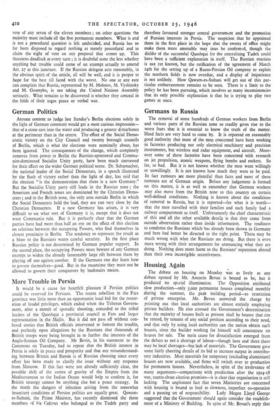German Politics
Anyone content to judge last Sunday's Berlin elections solely in the light of German comment would get a most curious impression— that of a stone cast into the water and producing a greater disturbance at the perimeter than in the centre. The effect of the Social Demo- cratic victory on the City Council and twenty borough councils of Berlin, which is what the elections were nominally about, has been ignored. The consequences of the change, which completely removes from power in Berlin the Russian-sponsored and Commu- nist-dominated Socialist Unity party, have been much canvassed for their effect on the wider German political scene. Dr. Schumacher, the national leader of the Social Democrats, in a speech illumined by the flush of victory rather than the light of day, has said that the election "is the demonstration that there is a new Germany." But the Socialist Unity party still leads in the Russian zone ; the American and French zones are dominated by the Christian Demo- crats ; and in the British zone, the only area outside Berlin in which the Social Democrats hold the lead, they are run very close by the Christian Democrats. If a new Germany has arisen, it is very difficult to see what sort of Germany it is, except that it does not want Communist rule. But it is perfectly clear that the German parties have had more than half an eye on the effect of this election on relations between the occupying Powers, who find themselves in closest proximity in Berlin. The tendency to represent the result as a blow to the Russians wants careful scrutiny. In the first place Russian policy is not determined by German popular support. In the second place, the occupying Powers must beware of any German attempt to widen the already lamentably large rift between them by playing off one against another. If the Germans one day learn how to govern themselves—good. But in the meantime they must not be allowed to govern their conquerors by backstairs means.






























 Previous page
Previous page